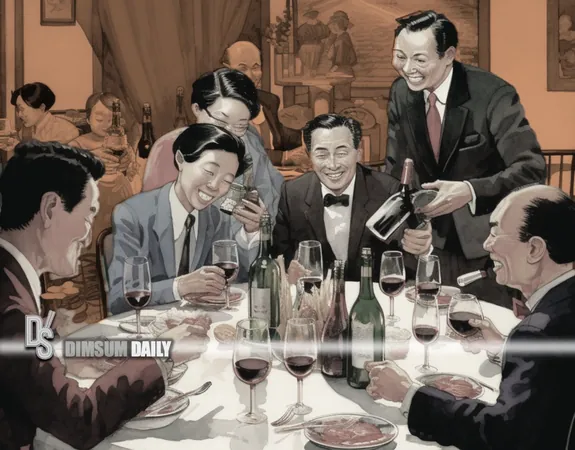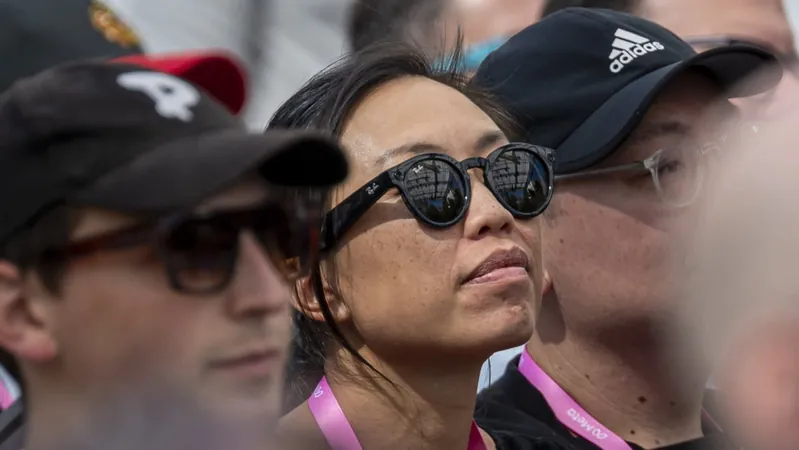
The Vinous Veil: Hong Kong’s Holiday Season Uncorked
2024-12-25
Author: Chun
As the glittering towers of Hong Kong shine brighter this festive season, a curious phenomenon unfolds. The city transforms into a playground for wine aficionados, who have elevated the enjoyment of a good bottle into an ostentatious display of wealth and social standing. In exclusive clubs and fine-dining restaurants, these self-styled sommeliers immerse themselves in the intricate art of wine tasting, often performing with more flair than substance.
Cynics would note that as Hong Kong's elite indulge in wine pairings and tasting notes, they might be spending astronomical sums on bottles they can barely differentiate from those sold at a fraction of the price. This curious penchant for extravagance has rendered wine cellars into vaults of exhibit-worthy collectibles, where a solitary bottle can cost more than the average household income for an entire month.
From the private chambers of Central to the swanky bars of Lan Kwai Fong, the atmosphere has taken on a theatrical flair. Middle-aged bankers and young corporate climbers are often overheard swapping absurd descriptions about the wines they sip: "This one transports me to a sun-drenched hillside, bustling with summer truffles and whispers of distant violets." Meanwhile, fellow tasters nod along, reluctant to acknowledge their own confusion about what they’re truly experiencing.
The pandemic has only heightened this competitive spirit among collectors. While many suffered in global isolation, the wealthy simply pivoted their tastings to personal residences, locking away collections valued in the millions. The paradox of hoarding wine in a city grappling with a housing crisis seems lost on them.
Yet this obsession has morphed into something more sinister than mere appreciation; it has turned into a quest for liquid trophies. Exclusivity reigns supreme at auctions held by Sotheby’s and Christie’s, where the most coveted bottles have become symbols of grandeur, each representing not just a drink, but a calculated show of status. The holiday season, with its twinkling lights over Victoria Harbour, witnesses these collectors organizing lavish tastings where prestige overshadows actual enjoyment.
For instance, the spectacle of 1982 Bordeaux bottles changing hands for sums that could cover a child’s university education exemplifies this phenomenon. Many buyers have no intention of consuming these wines, treating their purchases as high-stakes investments akin to stocks—an unsettling irony for a beverage once celebrated for its ability to foster camaraderie and joy.
The rituals surrounding wine culture in Hong Kong resemble religious ceremonies, with sommeliers acting as high priests before leather-bound wine lists worthy of the most dramatic scripts. The choreography of tasting—how the glass is tilted, the duration of the swirl, and the depth of the sniff—resembles an intricate dance more than a casual sip.
However, this burgeoning wine elitism has begun to infiltrate the drinking habits of the city’s younger demographic. Professionals feel obligated to memorize intricate details about varietals and regions, lest they risk ordering a house red and being met with judgment. Corporate Christmas parties abound with middle managers who recite wine facts from applications while secretly yearning for the simplicity of a good beer.
During the holidays, wine merchants seize the moment, peddling rebranded bottles under the guise of exclusivity. Mediocre champagne adorned with flashy holiday labels suddenly commands prices steep enough to stump even the finest chefs. Ironically, those who preach authenticity are often the first to fall for these marketing ploys.
As we embrace the New Year, the city buzzes with the growth of wine influencers showcasing lavish bottles against iconic backdrops, propagating the intricacies of the seemingly prestigious drinking culture. The pretense surrounding expensive wine continues to obscure the essence of what wine should embody: connection and joy.
As the year's end approaches, consider the parable within this phenomenon. Many who claim to be experts cannot discern between bottles of a $100 and a $1,000 wine in blind tastings, revealing the facade built around status and sophistication. Their so-called "knowledge" may be merely a well-crafted act, making for a dizzying display with little real substance.
Within the intimacy of private dining rooms, those same elite participants gathering to savor wine rituals may find themselves too preoccupied with documenting these moments for social media rather than truly enjoying what’s in their glass. The profound wisdom of ancient philosophers such as Seneca resonates here: "What difference does it make how much is in the jug? The important thing is the effect it has on your mind."
As Hong Kong's wine enthusiasts cling to their extravagant traditions, they might benefit from reflecting on a more genuine experience. True enjoyment of wine arises from embracing it for its ability to enhance relationships and amplify experiences, not through the price tag or prestige associated with it.
This holiday season, as the fervor of wine snobbery envelops Hong Kong, there lies a radical idea worth pondering: social status should take a back seat to authenticity. Ultimately, the most meaningful wine moments emerge from shared bottles with cherished friends, shining a light on the simple joys of life rather than an endless display of wealth. With the facade of opulence falling away, perhaps the best cup of wine is simply one that brings warmth and connection to the table—no labels or lofty expectations required.



 Brasil (PT)
Brasil (PT)
 Canada (EN)
Canada (EN)
 Chile (ES)
Chile (ES)
 España (ES)
España (ES)
 France (FR)
France (FR)
 Hong Kong (EN)
Hong Kong (EN)
 Italia (IT)
Italia (IT)
 日本 (JA)
日本 (JA)
 Magyarország (HU)
Magyarország (HU)
 Norge (NO)
Norge (NO)
 Polska (PL)
Polska (PL)
 Schweiz (DE)
Schweiz (DE)
 Singapore (EN)
Singapore (EN)
 Sverige (SV)
Sverige (SV)
 Suomi (FI)
Suomi (FI)
 Türkiye (TR)
Türkiye (TR)